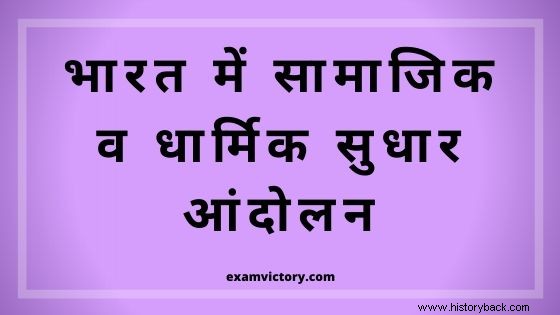In the 19th century, there were many social and religious reform movement movements in India, due to which the 19th century was considered as the century of religious and social renaissance.
Social and Religious Reform Movement in India

Brahma Samaj
It was founded by Raja Ram Mohan Roy in 1829 AD.
Its purpose was to end the evils prevalent in the then Hindu society like Sati system, polygamy, prostitution, casteism and untouchability etc. Raja Ram Mohan Roy is considered the Messiah of Indian Renaissance.
'Precepts of Jesus' is prominent in some of the major works of Raja Ram Mohan Roy and he also edited 'Samvad Kaumudi'.
He founded the Atmiya Sabha in 1815 AD and the Vendat College in 1925 AD.
He started a movement against the practice of Sati and expressed his support for Western education.
Raja Ram Mohan Roy's last word was 'Om'. He is also considered the father of nationalism.
After his death, the responsibility of looking after the Brahmo Samaj came to the responsibility of Devendra Nath Tagore. He appointed Keshav Chandra Sen as the Acharya of the external society. Sen considered Hinduism to be narrow.
In 1865 AD, Devendra Nath snatched away the mastery from him, then the Brahmo Samaj was divided.
- Bharatiya Brahmo Samaj (Sen)
- Adi Brahmo Samaj (Devendra)
With the effort of Keshav Chandra, the Brahma Marriage Act of 1872 was passed.
He got his daughter married to a 16-year-old prince of Cooch Vihar. Whereas due to these efforts, the Brahma Marriage Act was passed. Then the Adi Brahmo Samaj was divided.
- Bharatiya Brahmo Samaj
- Ordinary Brahmo Samaj
In 1831 AD, Raja Ram Mohan Roy went to Britain to favor Akbar II and died there.
He was given the title of Raja by Akbar II.
Ramakrishna Mission
Established in 1896-97 AD at two places, one in Bedur (Kolkata) and the other in Almora (Uttarakhand).
Its main inspirer was Ramakrishna Param Hans. The credit of spreading the teachings of Ramakrishna goes to his worthy disciple Swami Vivekananda (Narendra Nath Dutt).
In 1893, Vivekananda took part in the Parliament of Religions held in Chicago and made the western world aware of Indian culture and philosophy.
Arya Samaj
It was established by Dayanand Saraswati in Bombay in 1875 AD.
Its main objective was to try to re-establish Vedic religion in a pure form, to try to bind the religious, social and political in India and to eliminate western influence.
He was known as 'Moolshankar' in his childhood.
His guru was Swami Virjanand. He criticized idol worship, polytheism, incarnation, etc. and gave the slogan to return to the Vedas.
The resolution of his thoughts is found in 'Satyarth Prakash' and he wrote 'Satyarth Prakash' in Hindi, he also started the Shuddhi movement.
Young Bengal Movement
Henry Vivian Derozio is credited with starting the Young Bengal movement in India.
Derozio was a teacher of 'Hindu' college in Kolkata.
He established a 'Dominion Association' and 'Society for the Exhibition of General Knowledge' for self-expansion and social improvement.
Derozio 'East India' He also edited a daily paper called. Derozio is considered the first nationalist poet of modern India.
Theosophical Society
It was founded in 1875 AD by Madame Blavatsky and Colonel Alcott in New York (USA). In 1882 AD, he came to India and established his headquarters near Adyar in Madras.
The credit of spreading the activities of this movement widely in India is given to Mrs. Annie Besant.
In 1898 AD, he established the Central Hindu College in Banaras, which later became 'BHU' in 1916 AD. Done.
Besant established the Home Rule League in India on the lines of the Irish age of Home Rule.
Dahavi Movement
The credit for promoting it in India goes to Syed Ahmed Barelvi and Islam Haji Maulvi Mohammad.
First of all, this movement opposed the western influences on Muslims.
In its early days this movement was launched against the Sikh government in Punjab.
The main center of this movement Patna was in.
Prayer Society
Inspired by Acharya Keshav Chandra Sen, the Prarthana Samaj was established in Bombay in 1867 by Ranade, Atma Ram Pandurang, etc.
Its purpose was to oppose the caste system, increase the age of marriage of men and women and encourage widow-marriage and women's education.
Aligarh Movement
Started by Sir Syed Ahmed Khan. In 1877 AD, 'Anglo Muslim School' was established in Aligarh. By 1920, this center became Aligarh Muslim University.
